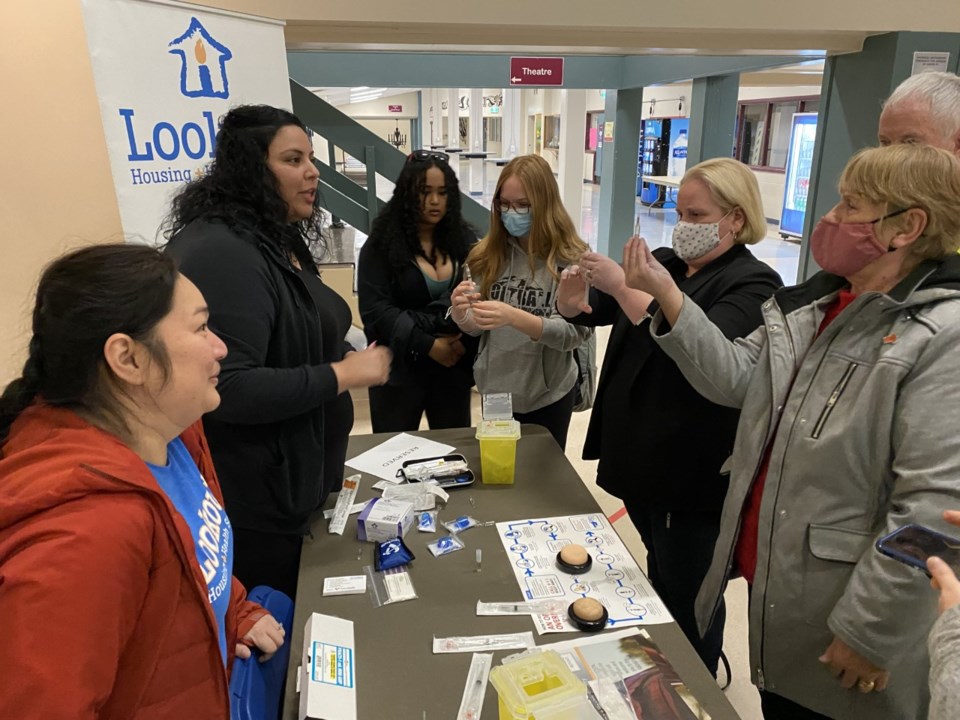Important messages when it comes to stigma were conveyed at a community forum on the opioid crises, which continues to claim Delta lives.
The End the Stigma Community Forum was held at North Delta Secondary Wednesday evening to hear from leaders and advocates on the stigma of drug use and what needs to be done to stop the growing number of overdose deaths.
The forum featured a panel discussion and question-and-answer session on how to best support those suffering from addiction in Delta.
The panel included Katie Alexander, Tsawwassen First Nation Health and Social Services Manager, Kirsten Hermanson, Manager of Prevention and Wellness with the Delta School District, Kam Singh, Mukti Society Substance Use Counsellor as well as Delta Police Const. Sean Cessford, an expert on street level drugs.
Guest speakers included Fraser Health Medical Health Officer Dr. Maulik Baxi, Curtis Joe, a Courage to Come Back Award recipient in 2013, as well as Guy Felicella, a peer clinical advisor and Courage to Come Back award recipient in 2021.
Facilitated by Deputy Police Chief Harj Sidhu and with opening remarks by Mayor George Harvie, the forum also had exhibitors who provide crisis, addiction and counselling services including The Little House Society, Deltassist, Fraser Health and the Lookout Society.
A collaboration between the City of Delta, Delta Police, Tsawwassen First Nation (TFN), Delta School District, Fraser Health Authority (FHA) and Delta Fire Department, the event rounded out with demonstrations on how to administer Naloxone.
Among the key messages was that people who use substances are not defined by their drug use, punitive thinking by others can distort the reality of what's happening in someone's life and that agencies and entire communities must work together to help end stigma to make it easier for people to access support and treatment.
Another message that was reiterated was that people with a problem need to be seen and heard without bias.
Baxi told the forum it's an uncomfortable, yet crucial conversation which must take place.
Joe, a youth worker for the Delta School District, described his difficult journey in an emotional presentation, saying he experienced much stigma throughout his life.
Every young person is different and may see things differently, so they must be recognized instead of automatically judged and admonished, he said.
“We need to stop pushing away and start embracing them...I wish I had someone. I wish I had parents. I wish had somewhere to go when I was tired,” Joe said.
Also describing his heart-wrenching story of substance addiction and how he finally began a road to recovery when someone showed they cared, Felicella warned stigma can be just as deadly as drugs, and how society viewed him as a young person drove him to the Vancouver Downtown Eastside.
The main driver for many when it comes to addiction and substance abuse is trauma, something many who judge critically fail to recognize when they see someone with a problem.
“How you treat me and how you view me can change the trajectory of people's lives,” said Felicella.
He later said, “How you view substance abuse will have a profound effect on your children and whether they will hide from you.”
A social planning update report to Delta council earlier this year noted the pandemic has significantly worsened the opioid overdose crisis in Canada and the impacts are being felt locally. From January to October 2021, there were 159 overdose events attended by BC Ambulance with15 overdose deaths in Delta. At the forum, the number of deaths for 2021 was updated to 20.
The City of Delta last year launched its Share Your Story initiative, a collaboration which includes DPD, the school district, TFN and FHA.
The campaign aims to reduce stigma around substance use and empower individuals to share their stories. It builds on Delta’s End the Stigma campaign, which was launched in 2020.
Meanwhile, the Delta Community Action Team is a community initiative established in 2018 by Deltassist and Fraser Health, and funded by the Province of BC, to develop a community response to the overdose crisis.
A staff report late last year on Delta’s draft new Social Action Plan noted overdoses are taking place in homes or workplaces, with a high concentration of suspected overdoses and addictions in the construction and trades sectors.
“This presents unique challenges in developing city-wide interventions and support systems for residents who need help accessing resources,” the report noted.
The report also stated that there is a problem of stigma, which can have a tremendous effect on people with mental health issues or those using drugs, and their ability to seek help.



